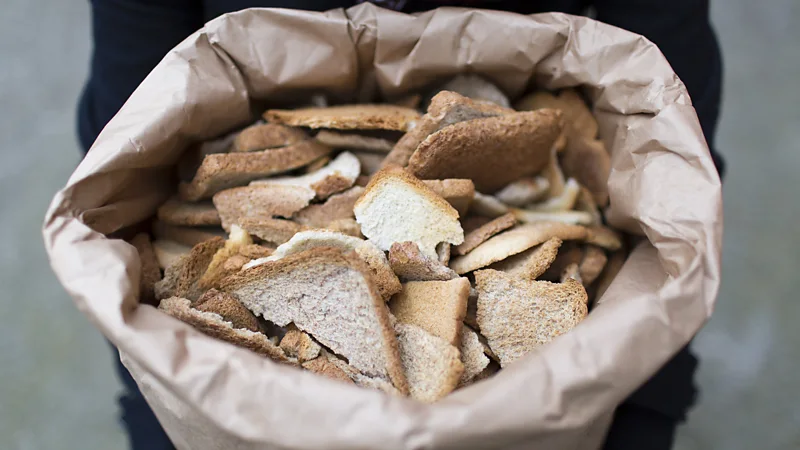Brewed from old bread crusts, the world's oldest beer recipe is experiencing a revival
An ancient recipe for Mesopotamian beer has survived the millennia to find new life as a modern drink, with a lower carbon footprint than many of its rivals thanks to its use of old bread crusts.

When people first sipped on a frothy – likely warm, and oddly thick – beer, the world looked different from today. The people who made it lived in Mesopotamia, in what is now southern Iraq. They were Sumerians, the earliest known civilisation in the region, who thrived in ancient cities around 4,000 to 6,000 years ago.
An ancient recipe discovered etched into a clay tablet is written as a poem to Ninkasi, the goddess of beer. "Ninkasi, it is you who handle [the] dough with a big shovel, mixing, in a pit, the beerbread with sweet aromatics," it reads. "It is you who bake the beerbread in the big oven, and put in order the piles of hulled grain." The poem reveals that the beer they were drinking was made not only from the usual grains, yeasts and water – but also from bread.
The Sumerians loved it – the pictograph for beer is among the most commonly used in Sumerian written language. And unlike most beer made today, it uses "beer bread", a twice-baked barley bread, to provide some of the sugars needed to get the brewing process started.
Millennia later, in 2016, the founders of Toast Brewing in London decided to revive this ancient recipe when they were confronted with the huge amounts of food waste created by factories and supermarkets. Tristram Stuart is an environmental campaigner at the non-profit Feedback, and Louisa Ziane is a sustainability expert at consultancy The Carbon Trust. They decided to make beer from wasted bread after stumbling upon the possibilities presented by the humble loaf.
Globally, an estimated 900,000 tonnes of manufactured bread ends up in the bin each year – that's 24 million slices of bread every day. Stuart caught a glimpse of the scale of this waste in 2013, on a visit to a sandwich factory that supplied a UK supermarket with packaged sandwiches.
"There was a big skip sitting out there that was just full of bread slices," says Ziane. When Stuart had a conversation with the company, they estimated there were 13,000 slices in that skip. Stuart's discussion with the factory revealed that the heel end of loaves and often the slices next to it are typically thrown away because they're not perfectly square.
Soon after, a chance visit to Belgium – and a taste of a bread-based brew at the Brussels Beer Project – inspired Stuart to turn wasted bread into valuable beer. "The idea that ancient peoples would revere the grain, and use it in a way to create a drink that helped to celebrate where that grain came from, tells the story of beer," Ziane says. Toast Brewing launched in 2016 with bottles of beer made from leftover loaves from London bakeries.
Perhaps the beer of the future could begin to look more like that of the past. Less lumpy, a little colder, but just as loved
A warm reaction to Toast's launch showed beer to be a novel way to engage people with a planet-sized issue. Around a third of all food produced is lost or wasted, and this accounts for as much as 8-10% of global greenhouse gas emissions. "We thought this is a really cool way for us to support the UK bakery industry to tackle food waste, while raising awareness among beer drinkers," says Ziane .
Brewing beer from bread is not without its challenges. "Early beers probably were a little bit bitty and maybe like an alcoholic porridge," Ziane says. The method took some adapting – including an industrial shredder to crumb the bread slices, and rice hulls to prevent the bread from becoming an impenetrable sponge in the tank.
The recipe Toast settled on replaces 25% of the grain with bread. In doing so, it replaces 25% of the carbon, water and land needed to grow the grain.
Stefan Schaltegger is founder of the Center for Sustainability Management at Leuphana University of Lüneburg in Germany and advises Krombacher, the largest beer manufacturer in Germany, on sustainability. Farming grain negatively impacts the environment in several ways, he says. "One important impact category is the contribution to climate change through greenhouse gas emissions. Another important impact category is water use and a third one is…biodiversity loss."
Around half of beer's environmental impact happens during the production of grain – an impact that is avoided when waste bread is used instead. Toast have calculated that, between 2016 and 2022, their use of waste bread avoided 61 tonnes of CO2 equivalent (CO2e).
The brewery's production process is the other major contributor to its impact. "There the main issue is energy use, and typically fossil fuels are used," Schaltegger says. "These are huge quantities, because you need very high temperatures, and you have to cool the beer down relatively fast, depending on what kind of beer you produce." Toast's brewery runs on gas and grid electricity rather than renewables, but making this shift is an immediate priority. The company's carbon footprint in 2022 was 206 tonnes of CO2e, which they plan to reduce to net zero by 2030.
Salvaging bread from landfill also prevents the release of methane, which is produced when bread, or any food, rots in an oxygen-poor environment. Methane is a highly potent gas that has a global warming impact more than 80 times higher than CO2 over a 20-year period. (Read more about eight hidden sources of methane worldwide.)
It is important that the grains and bread that have had their sugars extracted during the brewing process don't meet the same fate. Toast sends all their spent grains and soggy breadcrumbs to a local farm in south-east England to have a final use as animal feed.
This byproduct "starts smelling cheesy within a few hours, so it really needs daily collections," says Ziane. This means that the farmer collecting it must be based nearby – just as, in an ideal world, the bread would come from a bakery next door. (Read more about the climate benefits of eating locally on a budget).
"If you look back to pre-industrialisation periods, where you would have lots of little businesses co-located, you would often have a local brewer and a bakery next door to each other. The bakery would use surplus yeast from the brewer, and the brewer could use surplus grains from the bakery. It's become much more difficult to operate like that. But there's something really lovely about the potential for resilience through creating those relationships," says Ziane.
Though Toast now sources bread from the UK's larger commercial bakeries, the company is committed to keeping sales close to home. In other countries, including Belgium, the Netherlands and Australia, Toast partners with local brewers and bakeries to source bread and sell beer locally.
The final result is that Toast's beer has a carbon footprint of 604g (21oz) per litre compared to a UK average of around 700g (25oz) per litre, and a US average of 900g (32oz) per litre – although Toast's figure includes some of the carbon associated with the bread's production, despite the fact that the bread would otherwise be wasted.
There is still work to be done. Packaging typically makes up a big part of beer's environmental impact – ranging from 19 to 46% in the UK – and Toast is no exception. Packaging is responsible for as much as 56% of Toast’s carbon footprint. The company is now in the process of switching from glass bottles to cans, which according to the company halves the carbon footprint from packaging.
The best option for packaging depends on the options for reuse and recycling that are available locally. In countries like the UK that only use single use bottles or cans, the environmental burden is substantially higher, compared to countries like Germany which has a bottle return scheme, says Schaltegger.
And while it is clear that using a waste product instead of new raw materials is better for the environment, Schaltegger suggests caution when using waste. "If you take a broader systems perspective, is that the best place to use the old bread? Or would there be other places where you could use the old bread and reduce even more CO2?" Making sure the wasted bread gets eaten – and therefore prevents other bread from being produced – may be the optimum solution, says Schaltegger.
But until systems are in place that can eliminate food waste, repurposing unwanted bread is a smart idea. "You don't have to produce the respective amount of barley and malt, and of course the malting process needs a lot of energy. If you look at beer as a product, it will improve the carbon footprint of that beer," says Schaltegger.
For the environmental benefits of beer from bread waste to really make an impact, it needs to become mainstream. A small number of other brewers are already using bread, including Crumbs Brewing in the UK, Modist and Jester King Brewery in the US, Breer in Hong Kong, and Nääs Fabriker in Sweden. Toast has also made a home brew recipe available online for anyone interested in experimenting with the stale ends left in their bread bin. But the biggest step will be made by convincing big commercial brewers to integrate bread into their recipes. "We estimated that, based on the amount of beer that's brewed in the UK, if we can get brewers to switch just 10% of their malt base to surplus bread, then we could halve bread waste in the UK," Ziane says. "That's obviously a huge challenge, because the beer recipe is quite sacred."
Carbon Count
The emissions from travel it took to report this story were 0kg CO2. The digital emissions from this story are an estimated 1.2g to 3.6g CO2 per page view. Find out more about how we calculated this figure here.
The volume of bread wasted means that sourcing at this scale is unlikely to be a problem. The availability of unwanted bread is – sadly – consistent, Ziane says. "We have a fairly reliable supply, unfortunately. Because what happens is that bakeries… tend to plan to bake a little bit more, to avoid fines or delisting if they don't fulfil orders. So there tends to always be – excuse the pun – surplus baked in."
However, there will be plenty of loaves languishing in skips and pantries that could make their way into a frosty glass, until the problem of overproduction is addressed. Toast donates 100% of its profits to environmental charities, including Feedback, which are campaigning to end overproduction.
Above all, the ingenuity of the Sumerian's ancient recipe is a reminder that food has a value that we have come to forget. "The reason that we waste so much food is because we've lost this connection to where our food comes from, and this appreciation of nature and everything that goes into producing our food in the first place," says Ziane.
As Toast and their fellow bread-brewers attempt to make bread-based beer the norm, perhaps the beer of the future could begin to look more like that of the past. Less lumpy, a little colder, but just as loved.
-bbc






